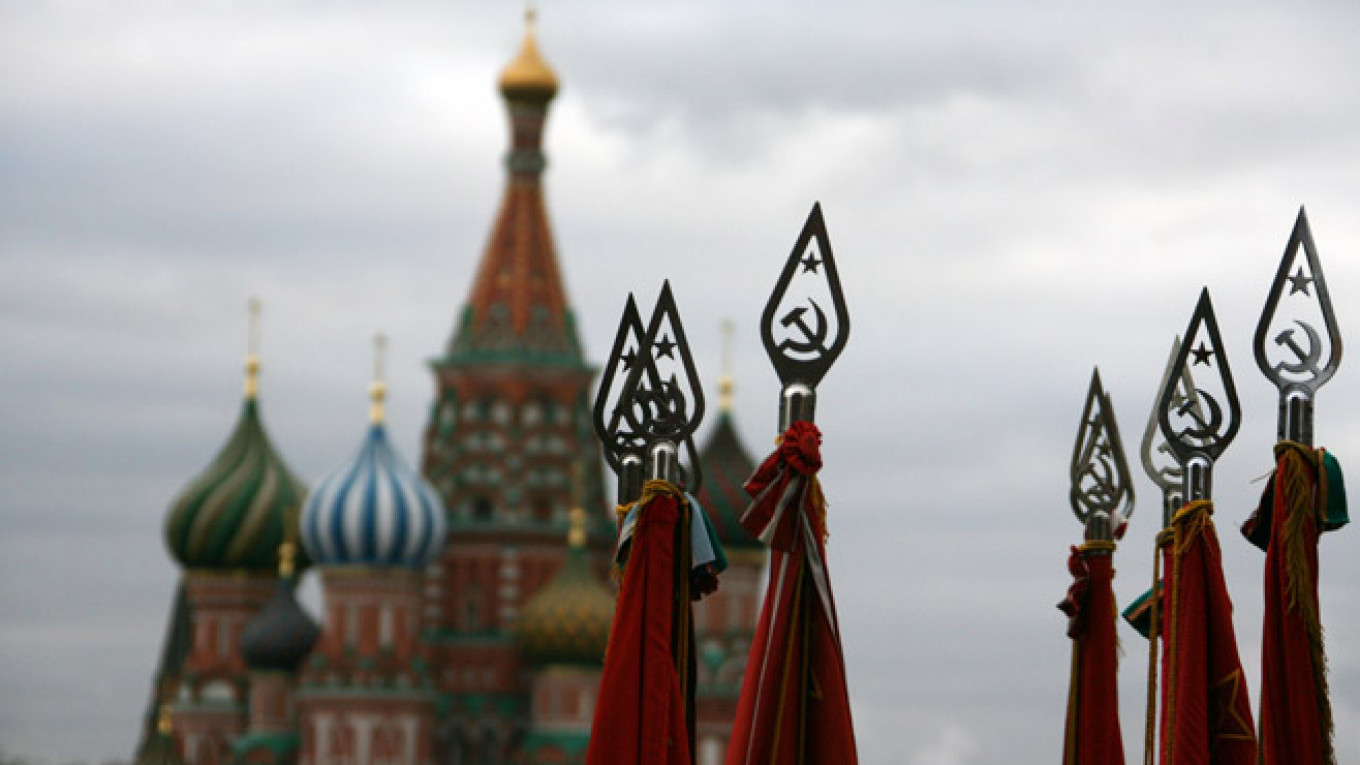Many observers have pointed out that some of the separatist leaders in eastern Ukraine have a past as participants in war re-enactments, playing out the great battles of history.
But what does that matter? If a person picks up a machine gun and begins killing people, he then becomes a bandit, regardless of his motivation. And yet there is something symbolic, a sort of sign of the times in these separatists' enthusiasm for the past.
As much as 10 years ago, perceptive commentators warned that Russia had embarked on a course "taking it back to the Soviet era." At that time, memories of the bleak and difficult final years of the Soviet Union were still fresh, and even those who pushed the country backward in history disavowed their role in the process. Now, officials recall those closing years with fondness and even pride.
At first it all seemed harmless, especially because the authorities took each "step backward" in pursuit of specific goals. Apparel industry representatives pushed for the introduction of school uniforms and senior education officials lobbied for "standardized textbooks."
Then it became increasingly dangerous: The return to centralized management of the economy and the massive financial commitments for modernizing the military could lead to a disastrous recession — albeit not as bad as the 1990 to 1992 downturn — once budgetary funds are exhausted.
Strangely, the authorities even want to revive this country's former political and economic isolation, even though nothing good can come from this. Sure, a 5 percent drop in Russia's gross domestic product — like a 5 percent drop in a person's monthly salary — is not fatal, but is it good? Of course not.
And yet there is a growing impression that leaders actually see some benefit in this "reconstruction" of the Soviet Union's past. One of the main reasons that Russia failed to significantly close the gap that developed between the Soviet Union and developed countries was the economic isolation into which Soviet leaders had driven the country.
And now, rather than doing everything in their power to achieve the lifting of sanctions, Russia's leaders are doing their utmost to make those sanctions even harsher. That in turn has made them fantasize, like their Soviet predecessors, that such measures can actually benefit the economy. They might as well fantasize about how Napoleon could have won the Battle of Waterloo.
This "reconstructionist" approach is evident everywhere. State-controlled television is now incapable of producing anything but bogus news with the adroitness of Soviet-era spin doctors. Government officials clearly believe that a lie told "in the interests of the country" is not really a lie and now hawkish writers are crawling out of the cracks in their eagerness to spread Kremlin falsehoods.
Ironically, today's officials refer to former Soviet leader Mikhail Gorbachev as a "weak" leader. Of course, Gorbachev had no qualms about firmly using the military, intelligence agencies and the Interior Ministry anywhere in the country when he saw cause to, even while the "reconstructionists" of the time whined that he was not showing a strong enough hand against their perceived enemies.
But state violence isn't the Moscow leadership's best imitation of the Soviet period. Their best imitation of that era's leadership is the way they engender feeling of utter helplessness and hopelessness.
Konstantin Sonin, a columnist for Vedomosti, is professor of economics and vice rector at the Higher School of Economics in Moscow.
A Message from The Moscow Times:
Dear readers,
We are facing unprecedented challenges. Russia's Prosecutor General's Office has designated The Moscow Times as an "undesirable" organization, criminalizing our work and putting our staff at risk of prosecution. This follows our earlier unjust labeling as a "foreign agent."
These actions are direct attempts to silence independent journalism in Russia. The authorities claim our work "discredits the decisions of the Russian leadership." We see things differently: we strive to provide accurate, unbiased reporting on Russia.
We, the journalists of The Moscow Times, refuse to be silenced. But to continue our work, we need your help.
Your support, no matter how small, makes a world of difference. If you can, please support us monthly starting from just $2. It's quick to set up, and every contribution makes a significant impact.
By supporting The Moscow Times, you're defending open, independent journalism in the face of repression. Thank you for standing with us.
Remind me later.






